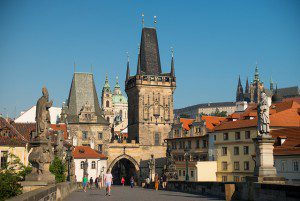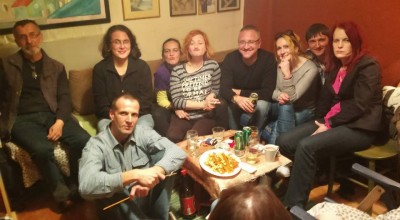Trust in a Stranger
Growing up in an American school system, we are taught the three golden rules: Don’t talk to strangers, don’t accept candy from strangers and don’t accept a ride from strangers. Mastering these rules to an extreme, I was fearful to walk alone between my primary school and home, which was only a fifteen minute walk for fear of being killed or kidnapped in the open abandoned weed and garbage infested field separating my home with school.
Fortunately, when we become adults, we have the liberty and sense to break these rules. And travel has been the perfect grooming ground for doing so. The moment I graduated college, I taught English for one year in the Eastern European country, Czechoslovakia (later during my stay, on January 1, 1993, the Peaceful Divorce would split the country into the Czech Republic and Slovakia). Prague frequently came up in conversations with my father and his cousin because they had lived there, so I felt the need to try it out for at least one year. I was placed through Education For Democracy, a Peace Corp-like program for North Americans to teach English in Czechoslovakia, at a private language school in the western Bohemian spa town of Karlovy Vary.
 One late Saturday morning in May, I was at the Prague central bus station trying to decipher an intricate bus schedule for reaching the southern Bohemian (western Czech) town of Tabor, 88 kilometers south of Prague to spend the day. Referring to my travel bible, The Real Guide: Czechoslovakia, it was less than two hours by bus, so I could make a quick visit for four to five hours then return to Prague the same day. Weekend day trips based out of Prague were a ritual since Prague is a centrally located transportation hub (in addition to being one of the world’s most beautiful capital cities, in my opinion) to use as the jumping off point for travel in all directions. As a history buff, medieval Tabor was on my list, known for its historical significance as being the center of what is known as the Hussite movement (named after leader and martyr Jan Hus), a social/religious revolution against the Catholic Church that swept through Bohemia during the early 1400s.
One late Saturday morning in May, I was at the Prague central bus station trying to decipher an intricate bus schedule for reaching the southern Bohemian (western Czech) town of Tabor, 88 kilometers south of Prague to spend the day. Referring to my travel bible, The Real Guide: Czechoslovakia, it was less than two hours by bus, so I could make a quick visit for four to five hours then return to Prague the same day. Weekend day trips based out of Prague were a ritual since Prague is a centrally located transportation hub (in addition to being one of the world’s most beautiful capital cities, in my opinion) to use as the jumping off point for travel in all directions. As a history buff, medieval Tabor was on my list, known for its historical significance as being the center of what is known as the Hussite movement (named after leader and martyr Jan Hus), a social/religious revolution against the Catholic Church that swept through Bohemia during the early 1400s.
With my limited Czech language skills, figuring out the Czech bus schedule was always a daunting and complicated task with many numbers and symbols hovering over the departure times that were references bottom explanations in Czech. There was Work Days, with a Sickle representing that day (that was the easiest one), School Days--only Mon thru Fri, only Saturdays, Only Sundays--with very limited service, No Sundays, Holidays.
Looking over me was an older man, probably around sixty years old who saw my struggling with the schedule and when he heard my minimal Czech language, he asked me where I was from. I told him that I was from America (Jsem z Ameriky) his eyes lit up as he had limited English knowledge from his school days but wanted to practice. He thought it was great that an American wanted to visit his hometown of Tabor.
Pointing to the time, I told him I wanted to take the 11am bus, but he read this schedule and said it does not run on Saturdays, just during school days. He said the next bus leaves at around 14:00 (2pm). Since I misread the schedule, I realized that my bus would not leave for Tabor until later in the afternoon which did not give ample time to visit the sites and return the same day, since the last return bus from Tabor was around 17:00. So by the time I would arrive in Tabor, I would have just an hour and immediately need to return on the last bus. Unaccustomed to spontaneity, I realized that this put a hiccup in my day trip plan. I needed to sleep over and felt a bit anxious because I usually plan my reservations. The man asked me my name and I replied, then he said his name was Jaroslav. He told me that I should not worry, he was also going to Tabor, so when the bus arrives, he will help me get the ticket and accompany me.
I had no misgivings about getting a bus ticket on my own, since I had done that many times to various places. I had that Czech line memorized, (One ticket to Tabor-Jedna vstupenka do Tábora). I just felt insecure about where I would sleep, if there would be availability, but mostly because I had to alter my heart set plan of seeing the sites and leaving so I could attend a Baroque concert the next day in Prague at a local church. But since concerts are a dime a dozen in Prague, I figured that was alright to skip.
Jaroslav told me he was visiting his elderly mother for the week and grew up in Tabor. He worked in the field of communications as a writer for a local newspaper. About ten years older than my father, with white hair, a small beard and a soft-spoken demeanor, I immediately sensed this was a peaceful, kind gentleman.
After returning from bus stations’ canteen to grab a quick lunch, Jaroslav who was still waiting at the platform, proposed that since the bus would be later, I could stay with him at his mother’s house overnight, see Tabor and take a bus back to Prague the next day, Sunday. I was stunned. Accepting an invitation like that from a complete stranger? My American sensibilities told me no, that is inappropriate and unsafe. But I was not in America, so I was not bound by the rules of my culture, I was in an Eastern European country. I knew this was an unusual proposition, to enter the house of not just a local, but a stranger whom I knew nothing about, only that we were both in the same place at the same time. As an American English teacher, I had been graciously hosted by many Czechs. As an American, I was somewhat like a celebrity, someone whom Czechs were very curious about and with whom they wanted to practice their English, while learning about American culture first hand, not just through TV shows such as Dynasty and Dallas which were newly broadcasted and quite popular. Czechs told me that this is how they envisioned typical American life. I quickly cleared up that misconception.
I felt unprepared to be Jaroslav’s guest since I had no gift in hand, no reciprocal memento to show my gratitude. For him, it was no problem; just the opportunity for him to practice his minimal English was good enough a gift for him. So I agreed.
When we arrived at his mother, Marie’s apartment, she seemed a bit shy and cautious when she saw me. But she seemed to trust her son’s discretion to let an American stranger into her home. Her hospitality reached far beyond the welcome tea, the typical Czech pastry called, kolach, to delicious homemade Czech meals such as dumplings, meat with gravy and cabbage, to questions, smiles, and acceptance. Usually the first three questions I get asked in the Czech Republic are where in America I am from, what is my profession and what do I think of their country? They showed me older family photos and his school photos when he was a child during the 40s. I was offered a bed in the office/guest room and slept soundly that night.
The next day, after breakfast, Jaroslav became my personal tour guide showing me the well-known Tabor sites such as the center square called Zizkovo namesti with Jan Hus’ statue and the church tower hovering above, then we explored the Museum of the Hussite Movement. We walked through the tangle of backstreets typically laid out in a medieval city, but did not get lost because he was guiding me, yet I would not have minded getting lost. He even showed me his old secondary school.
Spending time with Jaroslav, made me realize the importance of trust and how easy it was to do in this country. Twenty-four hours ago we were complete strangers, but now we were friends and I was continuing to learn about the human side of Communism, since components such as free health care, education, and social programs for the disadvantaged and elderly were not completely eradicated. Meeting Jaroslav and folks like him humanized a system that the media portrayed so abstractly and superficially. I had talked and spoken to people who lived under the Communist system for practically their whole lives. If Jaroslav was 60 in 1993 and the Velvet Revolution occurred in 1989, there were only a few years of a completely new political and economic system. I learned that the transition has been difficult for many, especially the elderly who are not just set in their ways, but rely on the security that the state provided for them once they retired. Jaroslav told me that his mother lives on a pension and that the health care system is relatively the same as it was during the Communist era except now additional private health companies are forming.
Yet, I also saw a lot of expression in this newly democratized country--the press, art, philosophy, people were speaking their minds and hearts And Jaroslav seemed to be
embracing the openness too as he was able turn an American stranger into an American friend.
Jaroslav was to stay with his mother for the rest of the week, but after our hearty Sunday lunch, he walked me to the bus station. He gave his address and phone number telling me if I ever needed any help to please contact him.
Months later after returning to the States, he sent me a pretty blue stone necklace and a letter wishing me well and giving regards from his mother.
There really are good, honest people in this world whom I can meet practically anywhere. This time it was the bus station. The next time it can be at a restaurant, a park bench, a lookout point, anywhere. Embarking on this Czech journey during my early 20’s was just the beginning of many future journeys where my world would collide with a stranger from another world, turning us into friends.
Amy In Wanderland
World Traveler and Explorer; Artist; Film/Media Specialist; Environmental and Human Rights Activist
Photo credit: romanboed via Foter.com / CC BY
